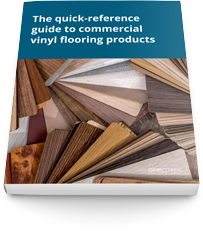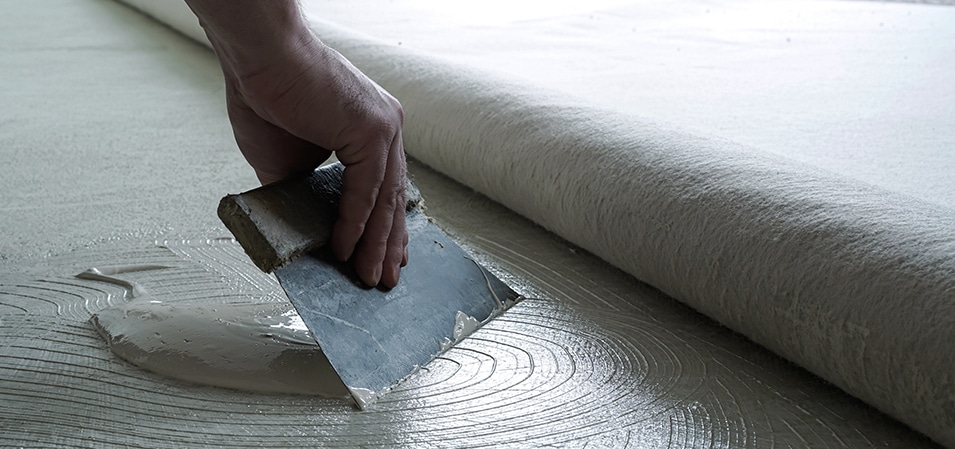Commercial vinyl flooring: LVT vs. VCT vs. vinyl sheet flooring
Commercial vinyl flooring is a durable flooring material made from a combination of natural and synthetic polymer materials. It’s found everywhere from hotel lobbies and office foyers to schools and hospitals. And it’s rapidly being adopted in more and more settings due to design and material innovations.
Choosing the type of commercial vinyl flooring best-suited for your application depends on several factors including lifetime cost, design preferences and length of time you intend to use the product. While there are many vinyl flooring options, they fall into three broad categories:
- Vinyl sheet flooring
- Vinyl composition tile (VCT)
- Luxury vinyl tile (LVT)
While all three are durable materials well-suited for high-traffic commercial applications, they’re differentiated by maintenance requirements, lifetime price and design versatility.
VCT tends to be the cheapest initially, but it requires regular stripping, waxing and polishing. Over time, the extensive maintenance VCT requires can cause its lifetime cost to far exceed vinyl sheet flooring or luxury vinyl tile. Both vinyl sheet and LVT have minimal maintenance requirements. But if a roll of vinyl sheet is damaged, you have to re-cut and install the entire roll, rather than replacing one tile.
LVT tends to have the greatest design options, with products on the market that are nearly identical to the premium products they mimic. And with the lowest maintenance requirements and greatest durability, LVT provides the greatest long-term value of the three options.
If you only intend to use the facility for a couple years —as with businesses leasing a property— or upfront costs are a big concern, VCT or vinyl sheet flooring are great options. In general, though, LVT tends to provide the best value over the life of the flooring system. Read on for a more detailed look at the pros and cons of each type of commercial vinyl flooring.
What is vinyl sheet flooring?
Sheet vinyl flooring is a continuous sheet of polymer materials manufactured in widths of about 6 to 16 feet. It’s similar to LVT in that it has a protective outer wear layer above a digital graphic film layer, but the film layer sits on an internal felt layer. It’s durable and used for unique designs that require larger sheets without visible seams.
Vinyl sheet flooring comes in large rolls, minimizing the number of seams and making it ideal for healthcare facilities where fall prevention is a key concern. Conversely, the lack of seams makes maintenance more difficult: If a section of vinyl sheet flooring gets damaged, you’ll need to cut and replace the entire section rather than just swap a tile.
Vinyl sheet flooring tends to cost more than VCT, but less than LVT. And while it has similar design versatility as LVT, it makes sense to pay a little more for LVT if enhanced durability is a key concern for your application.
What is vinyl composition tile (VCT)?
VCT is a mixture of natural limestone, filler materials, thermoplastic binder and color pigments. Made by fusing chips into solid sheets and cutting them into tiles, VCT requires layers of polish to protect its porous surface. Because of this, VCT is not a low-maintenance flooring product. It requires regular stripping, waxing and polishing, while LVT and sheet vinyl can get by with routine sweeping and mopping.
High maintenance costs can cause the lifetime cost of a VCT installation to exceed that of vinyl sheet flooring and LVT. And while VCT comes in a variety of colors and patterns, it doesn’t meet the same level of texture and design versatility available in LVT tiles and or vinyl sheet.
Until LVT came along, vinyl composition tile (VCT) was the standard for high-traffic commercial areas. While it isn’t used as much today as it was 10 years ago, you’ll still find VCT used in many healthcare and educational applications due to its durability and low upfront costs. When upfront material costs are a primary concern, VCT is a functional and durable commercial flooring option worth considering.
What is luxury vinyl tile (LVT)?
LVT is made of a predominately limestone-based material mixed with composites. On the composite material sits an adhered digital graphic film, which can be created in nearly any look, sealed beneath an outer wear layer.
While LVT is the most expensive of the three initially, its lifetime costs tend to be lower due to its superior durability and minimal maintenance requirements. And due to the versatility of its graphic layer, LVT provides superior design capabilities to VCT.
In the past decade, manufacturers have released an impressive spread of new LVT products. Materials are now available in new sizes and shapes, such as hexagons and planks, making new and innovative designs possible. Digital graphic film layers have improved to the point that many are indistinguishable from natural materials, such as premium stone finishes and rich wood floors.
At the same time, the quality of new LVT composites and wear layers has made the material durable enough to withstand some of the most heavy-duty settings, often replacing traditional materials such as ceramic, marble and wood. And because LVT has the best lifetime value and greatest design versatility, we tend to recommend it over other commercial vinyl options.
Why select commercial vinyl flooring for your facility?
Vinyl can withstand water, sunlight and heavy use, and some materials even come pre-treated for cleaning and infection control. At the same time, the emergence of digital graphic layers provides nearly limitless design versatility.
Because of its versatility and durability, vinyl is a good flooring material to consider in almost every commercial application. Some of the only areas vinyl isn’t used as commonly is in heavy-duty kitchens and industrial applications. Quarry tile has been proven to withstand the high-moisture, high-impact environments of commercial kitchens. And polished concrete or epoxy flooring might more common industrial flooring materials.
For almost any other application, though, vinyl is a functional and aesthetically appealing option. Many vinyl floors now offer premium-quality finishes and durable surfaces at far less cost than traditional materials, such as stone and wood.
At Spectra Contract Flooring, we help you select the most cost-effective commercial vinyl flooring with a life cycle costing analysis, which shows the cost of your floor, both up-front and over time. In the majority of cases, the analysis shows LVT as the better option, and it’s what we typically recommend.
Specification and installation considerations
Before you have your contractor install your flooring, we highly recommend testing your underlying concrete slab for any moisture issues, which can damage your floor and even void your warranty. After installation, we recommend working with your contractor to set up a proper flooring maintenance plan. You can also save money by leveraging your flooring contractor’s expertise to specify greatest-value commercial vinyl flooring materials and source them at reduced rates.
At Spectra Contract Flooring, we’ve completed more than 400,000 flooring installations. And we’ve compiled all we’ve learned into a vinyl flooring product guide. You’ll receive quick takeaways about the pros, cons, price and performance of LVT, VCT and vinyl sheet flooring. Download your guide today.

Reference guide to commercial vinyl flooring products
Take the guesswork out of vinyl product selection. This guide cuts through the noise, offering you quick takeaways about the pros, cons, price and performance of LVT, VCT and vinyl sheet flooring.











